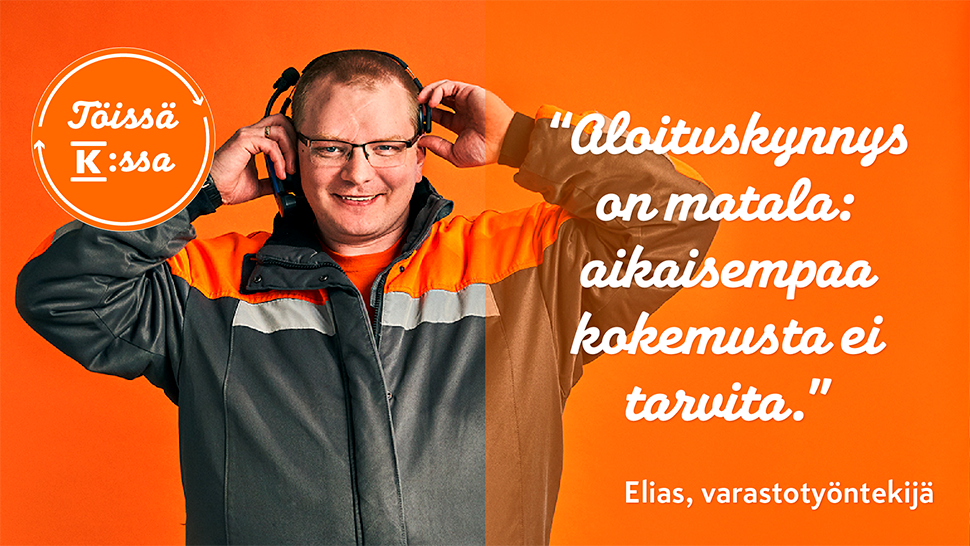Matias Tiainen, 28, loves numbers and solving mathematical problems. In his work as a Data Scientist, he gets to apply artificial intelligence to business as one of K Group’s 500 IT and digital experts.

Warehouse worker Elias onboards new arrivals as an instructor and knows what it takes to succeed on the job

Elias Tölli began working at K Group’s central warehouse in Vantaa’s Hakkila in 2008, right after completing his training as a stockkeeper. Although he has stayed in the same Industrial Products department since the start, his tasks and duties have varied, and his responsibilities have increased with experience. For the past seven years, Elias has spent most of his workdays training new employees, while still doing product picking on the side.
Perhaps the most significant factor that has kept Elias in the job for so long is the competitive salary, which he has been able to impact with his performance since the beginning.
“The base salary follows the sector’s collective agreement. On top of that, you can earn extra based on personal performance. In my department, the average extra pay on top of the base salary is around 3-4 euros per hour, and you can also do overtime during busier times. A gross salary of three thousand euros is not uncommon here,” says Elias.
The main requirement is to be in good physical condition
The warehouse in Hakkila operates in three shifts. Morning and evening shifts alternate weekly, and night shift workers form their own team. In addition to full-time employees, there are also so-called flexible workers: part-time workers and employees who are called in as needed.
“In my department, during busy times we have over a hundred collectors and 20-30 forklift drivers per shift. Flexible workers are brought in as needed – there are usually some 200 to 300 on the list.”
The warehouse is constantly looking for new employees, and they try to hold onto the good ones they have, notes Elias. The threshold for entry is fairly low: no specific education or previous work experience is required. The type of employment and the number of work hours can be agreed upon with flexibility, depending on each worker’s situation. Thus the work suits well for students and people considering a career change, for example.
“All workers really need is to be in good physical condition, proficient in Finnish, and considerate to other people. Attitude is also important. Personally, I've decided to view all tasks assigned to me, even the less pleasant ones, as a challenge, and to do them well the first time so that there's no need to revisit the issue,” Elias says.
Orientation period provides a soft landing
All new employees go through an eight-day orientation, which starts with the basics and gradually progresses to concrete tasks. Key points include workplace safety, ergonomics, and quality.
“As instructors, we start the orientation of newcomers by helping them get their work clothes, safety shoes, and locker keys. We show them the locker rooms and the managers' rooms, go over the main routes, get to know the facilities and machinery, save important phone numbers, and so on,” Elias explains.
Once a newcomer has mastered the basics , they move on to actual work in groups: first so-called sticker-based picking, and then voice-directed picking.
Voice-directed picking is assisted by a Talkman and a microphone, which each new employee receives when they start their shift.
“You log into the device and enter the end time of your shift. The device starts offering new tasks to the worker based on the available time, and guides their work. Most of the work is done using this voice guidance; for sticker-based picking, you get the corresponding instructions with printed stickers at the beginning of the day.”
When newcomers transition to independent picking work, Elias and the other instructors are there to support them: “We encourage them, give advice, and tell them to ask questions. This is important for both learning and for developing our orientation process.”
A big company can offer many opportunities
For Elias, thirteen years with the same employer have gone by quickly, and at least for now, he does not expect to change companies.
“I've enjoyed the work because it varies and is independent, and we have a good team spirit here. I have an easy relationship with colleagues and managers, and my manager has taken onboard my ideas and suggestions. A big company can offer certain benefits, and especially during the pandemic, continuity and having enough work was particularly important,” Elias notes.
As a sociable and chatty person, Elias has enjoyed the task of onboarding new arrivals and training other instructors, as well as developing the practices and instructions related to the orientation process. He also welcomes new challenges:
“I am interested in managerial tasks. A big company offers opportunities for advancement – we'll see what the future holds.”
 YES
YES
 NO
NO

